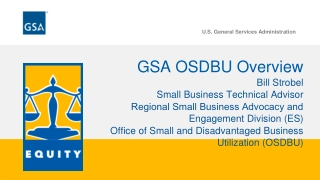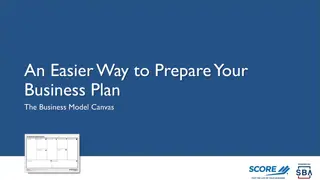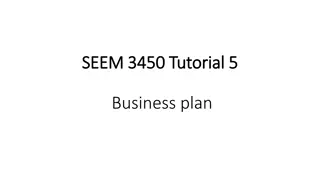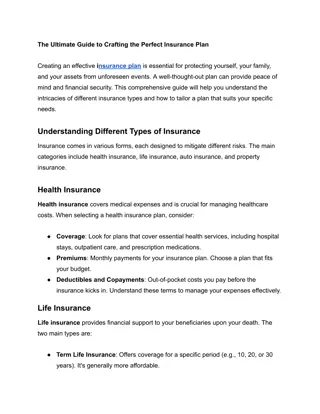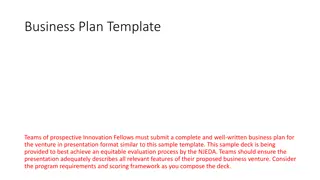
Crafting an Effective Business Plan: A Comprehensive Guide to Success
Learn the importance of a business plan, its key components, pitfalls to avoid, and methods for evaluation. Understand how a business plan outlines goals, strategies, and paths for success. Discover essential elements including executive summary, company overview, market research, products/services, marketing & sales plan, management structure, financial projections, and funding requirements. Start crafting your business plan today for future success.
Download Presentation

Please find below an Image/Link to download the presentation.
The content on the website is provided AS IS for your information and personal use only. It may not be sold, licensed, or shared on other websites without obtaining consent from the author. If you encounter any issues during the download, it is possible that the publisher has removed the file from their server.
You are allowed to download the files provided on this website for personal or commercial use, subject to the condition that they are used lawfully. All files are the property of their respective owners.
The content on the website is provided AS IS for your information and personal use only. It may not be sold, licensed, or shared on other websites without obtaining consent from the author.
E N D
Presentation Transcript
Crafting an Effective Business Plan A Guide to Structuring Your Future Success
Learning Outputs What a Business Plan is? The Purpose of a Business Plan Key Components of a Business Plan Practical Tips for Writing a Business Plan Common Pitfalls to Avoid Methods for Evaluating Your Business Plan
Understanding a Business Plan A business plan is a strategic document that outlines your business goals and the path to achieving them. It s vital for both new ventures and established companies. It provides a clear roadmap for where your business is headed and how you ll get there. How will you boost revenue or increase assets? What are your plans for market expansion? What does success look like in the next 1 to 5 years? A business plan isn't just for startups it's a valuable tool for businesses at all stages. .
Goals of a Business Plan Your business plan should articulate your vision and outline the steps necessary to achieve it. It details your strategies for growth, finances, marketing, and operations. What must happen for your business to succeed? What are your key objectives and how will you reach them? This document serves as both a daily guide and a performance benchmark. It helps you understand competitors and industry trends, which strengthens your positioning in the market.
Essential Elements of a Business Plan Business plans are adaptable documents that evolve over time. A comprehensive plan generally includes: 1. 1.Executive Summary Executive Summary 2. 2.Company Overview Company Overview 3. 3.Market Research Market Research 4. 4.Products/Services Products/Services 5. 5.Marketing & Sales Plan Marketing & Sales Plan 6. 6.Management Structure Management Structure 7. 7.Financial Projections Financial Projections 8. 8.Funding Requirements Funding Requirements
Essential Elements of a Business Plan Executive Summary This opening section is your elevator pitch. It should succinctly capture the essence of your business, including its mission, offerings, and key strategies for growth. Although it comes first, it's often best to write it after completing the rest of the plan. Keep it concise Keep it concise: Summarize your key points on a single page for maximum impact.
Essential Elements of a Business Plan CompanyOverview The next section gives readers an insight into your business. Include details such as: The official name and location of your business Key personnel and their qualifications Your business structure (e.g., sole proprietorship, partnership) Company history and your current operational status This sets the stage for discussing your future goals.
Essential Elements of a Business Plan Market Research & Analysis This section dives into the market environment, including the size of your target market, competitive landscape, and industry trends. Define your ideal customer profile Study industry trends and market conditions Conduct competitor analysis to determine how you ll stand out Rigorous market research helps validate your business idea and supports your projections.
Essential Elements of a Business Plan AnalyticalTools Use market analysis tools to better understandthebusinessenvironment: SWOT Analysis : Strengths, Weaknesses, Opportunities,Threats Porter s Five Force Analysis: Analyse the competitive intensity of your industry PESTLE: Political, Economic, Social, Technological, Legal, and Environmental factors
Essential Elements of a Business Plan Product/ Services Detail the products or services you offer. Highlight how your offerings address customer needs and what sets them apart from competitors. Value Proposition Value Proposition: What problems do you solve? Features & Benefits Features & Benefits: Why choose your product/service? Pricing Strategy Pricing Strategy: How do you price your offerings competitively? Include plans for future product or service development.
Essential Elements of a Business Plan Marketing and Sales Strategies Explain how you will attract customers and drive sales: Marketing Tactics Marketing Tactics: Examples include social media marketing, content marketing, and influencer partnerships Sales Approaches Sales Approaches: Methods like free trials, discounts, or referrals Conversion Strategies Conversion Strategies: How will you turn prospects into paying customers? Be clear about your approach to reaching and retaining your audience.
Essential Elements of a Business Plan Management and Organisation Provide an overview of your organizational structure, highlighting key personnel and their roles. Include: Management hierarchy Owners and board of directors (if applicable) Skills and experience of your leadership team Use an organizational chart if helpful.
Essential Elements of a Business Plan Financial Projections This section outlines your revenue model, expected profitability, and how you plan to manage cash flow. Sales forecasts Budget for expenses Cash flow statements Profit and loss forecasts Ensure projections are realistic and based on credible data.
Essential Elements of a Business Plan Funding Requirements If you need external funding, this section should specify: How much you need and when The purpose of the funds (e.g., equipment, marketing, etc.) Type of funding (equity, debt, grants) Justification for the funding request, demonstrating how it will fuel growth
Tips for Crafting a Business Plan Keep Keep it it clear technicalterms. Do Do your your homework yourmarket,competitors,andcustomers Be Be concise concise: Use bullet points, charts, and infographicsforclarity Protect Protect sensitive sensitive info info: Use NDAs when sharingconfidentialdetails Revise Revise regularly regularly: Update your plan as your businessevolves clear: Avoid jargon and simplify homework: Thoroughly research
Common Pitfalls to Avoid Lack Lack of of planning processcanleadtomisdirection Ignoring Ignoring cash cash flow flow: Profits are important, but cash flow is vital for day-to-day operations Failing Failing to to validate validate your your idea beforelaunching Unrealistic Unrealistic assumptions assumptions: Base projections onreliabledata,notwishfulthinking planning: Skipping the planning idea: Test the market
Evaluating Your Business Plan Executive Executive Summary compelling? Business Business Strategy willsolveaproblemandgeneraterevenue? Market Market Analysis Analysis: Are your claims about the marketbackedbysoliddata? Financial Financial Plan Plan: Are realisticandachievable? Getfeedbackfromindustryexpertstorefine yourplan. Summary: Is it concise, clear, and Strategy: Does it outline how you your projections
Activity Create a business plan for a business idea of your choice using the key elements discussed.









